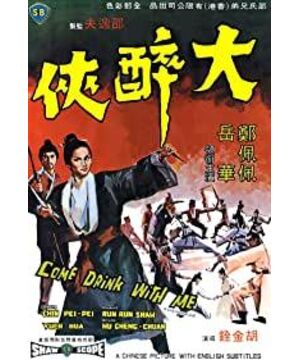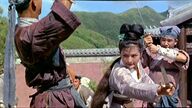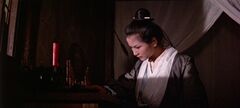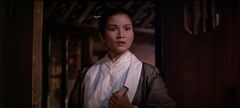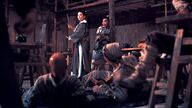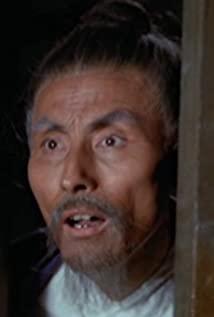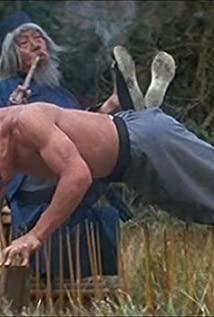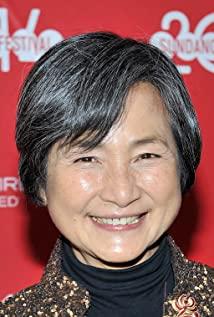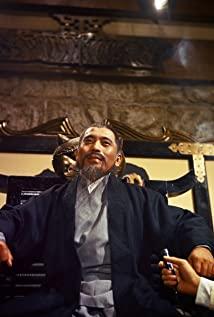Hu Jinquan's "Drunken Man" is a sober world that seems to be drunk but not drunk, the leaping and jumping in the bamboo forest in "Chivalrous Girl", the desperate struggle in "Dragon Inn" outside the border gate, the Zen-like "Empty Mountain Lingyu", Hu Jinquan's martial arts films It focuses on the ideal of swordsmen and chivalrous warriors in China throughout the ages to improve themselves by saving people and saving the world. For Chinese audiences who grew up in the indoctrination of martial arts novels, Hu Jinquan's martial arts films are simply a mysterious imaginary world projected directly onto the screen, and you will never forget it at a glance. The opening and closing of the atmosphere and the lingering meaning have never been seen in other movies, and that is what the movie I have watched all my life has been looking for - China.
The ethereal and detached pursuit of heroes who connect ancient and modern people laughed and said that martial arts films are often considered to be the type of films with the lowest artistic level, but in a blink of an eye they have become the best in the world. The Comprehensive Technology Award, as director, screenwriter, editor, and art director, Jinquan Hu has since become famous all over the world.
Hu Jinquan is known for his martial arts movies, such as "The Drunken Man", "Dragon Inn", "Chivalrous Girl", "Rage" of "Happy and Sad Music", "Storm in the Yingchun Pavilion", "Loyalty Picture", "Legend in the Mountains", "Empty Mountain Spirit Rain", etc., are all fine works. Why so few? This is due to his personality, sometimes too real, sometimes too ethereal.
Hu Jinquan is a real person, and he is extremely dedicated to his work, as well as art, costumes, props and other aspects. Meticulous. The set buildings, costumes and props are all verified to ensure that the historical records are accurate. He is self-taught, and especially likes to study Ming history, so most of the film's story backgrounds are set in the Ming Dynasty.
His honesty and loyalty can also be seen in the play. The story is well-organized, the characters are loyal and treacherous, and the character characteristics remain unchanged until death, and the complex inner contradictions are almost invisible. The conflict between the positive and negative sides gradually unfolds, and the levels are progressive until the climax, rarely breaking the classic model. It is said that he has been in the film circle for many years, and he should have written sensual and sensual dogs and horses, but he is too clumsy in romance. The heroines created by him are more than stubborn, but not delicate enough, and are rarely charming and coquettish. Often suspected to be neutral.
In this way, Hu Jinquan is only extraordinarily serious. How can he become famous and become a master of a generation? This is because there is an ethereal and detached side of his character, and he has an aesthetic pursuit for movies, trying to use martial arts movies to reflect this supreme aesthetic ideal. His filming has been delayed again and again, which made the producers intolerable, and often gave Jiang Lang a sense of lack of confidence. In fact, his film aesthetics far surpassed the era in which he was living, and he was unique in the world. As Ang Lee commented, "It is very China is very modern and very original." Hu Jinquan's martial arts films neither copy operas nor exclude them, but excavate elements with a sense of film in them, transforming the dramatic dynamic into the cinematic dynamic. He transforms Peking Opera movements into dance, elegant and intoxicating, and extraordinary in style, without departing from the specific theatrical situation. He emphasizes a realistic and moderate exaggeration to the action, allowing the characters to slightly overcome the gravity and draw graceful arcs in the air.
His films are often refreshing because they attach importance to scene scheduling and editing, and have a rebellious spirit. They have the courage to break through the conventions, which is just the opposite of the character of handling props cautiously. The purpose is to arouse the audience's interest in the action, regardless of whether it is clear or not. Chu. The techniques of jump-cut, multi-angle shooting, and short-shot stitching pioneered by the French New Wave can be seen everywhere in his films, whether it is intentional learning or self-taught. With various shots with incomplete compositions, he comprehensively constructs seamless and perfect passages, which is pleasing to the eye, philosophically far-reaching, and breathtaking. Many people praised his understanding and grasp of this modern editing method with a Zen-style epiphany.
The chivalrous warriors created by Hu Jinquan are similar to others, they are nothing more than wandering the world and speaking with integrity. The difference is that he actually practiced, and moved the old-fashioned chivalrous tenderness from the illusory world on the screen to the real world. In the early 1980s, he learned about the history of blood and tears of Chinese workers in the United States, and he couldn't help but fill up his debts and fight for the disadvantaged. He planned to shoot a film called "The History of Chinese Workers' Blood and Tears". However, the filming work was delayed again and again due to insufficient funds. After fifteen years, they finally got enough investment. However, on January 14, 1997, Jinquan Hu unfortunately passed away at the age of 65.
Zheng Peipei: "It was really a beautiful era." "Jin Yan" spread his wings with dance as a martial art. I remembered that I was only 19 years old at the time and didn't know anything about martial arts. Although I had also acted in several films before, there were literary and musical films. But it seems that I have always been confused that Dong has not "recovered", and it was Director Hu's personal decision to ask me to play "Golden Swallow" in "The Drunk Man". At that time, the company considered that it wanted to find a girl from the "Northern School" (Yue Opera or Peking Opera performer) to play the role. Director Hu insisted on finding it himself, thinking that I had a background in dance, and the feeling of using "power" was different. Director Hu highlighted my strengths and kept telling me his thoughts, including how to master the "rhythm", which was a great benefit to me.
The most unique thing about him is that he takes the actors into the cutting room and tells us how to find the rhythm and joint points in the 24-frame frame, although it was a crude and primitive method at the beginning, including those special effects, how to show "qigong"? It is to hide the tube in the sleeve, these are all groping for ourselves. Because Director Hu was an actor before and knew how to act, I heard an inside story from Ding Shanxi, the assistant director at the time. In fact, Director Hu originally wanted to play the big drunk who hides his real kung fu! Director Hu and Director Zhang Lu Xiang were different. Director Hu left Shaw Brothers and went to Taiwan after filming "The Drunk Man". I was very loyal and wanted to follow me. The company agreed that I should go to Japan to learn dancing in 1967. I went to Japan before my contract expired. After Director Hu left, the company felt that the role of "Golden Swallow" in "The Drunken Man" could be recreated, so it decided to let Zhang Che direct "Golden Swallow", or hire me to play it. I wasn't very happy at the time, mainly because I didn't want to use such a unique name in Director Hu's "Drunken Man". It was entirely possible for a man to take another name. Zhang Che said that the name "Golden Swallow" is just like a person's name. You can I can use it too. I was already in Japan at the time, and the location of "Golden Swallow" was filmed in Japan.
Zhang Che's self-proclaimed "Golden Swallow" (1968) truly established his own style, in which he can be seen increasingly embodying the lofty ambitions of male chivalrous men. The female characters are ignored. The most impressive scene, he made the other two knights jump out of the window and arranged for me to go through the gate. I was very good at the time, so I argued with him why I couldn't jump out of the window and he said you were a girl and should go. The door, and then I finally managed to jump out of the window with the chivalrous man. I don't work much with Director Zhang, except for "The Golden Swallow", in "Flying Swordsman" co-starring with Luo Lie in 1969. The most enjoyable and the most mutual understanding is Director Hu. I admire his character and unique character. The personal feelings are also deeper.
At that time, I looked back and wondered whether it was my own temperament that gave the "female hero" in the movie a demeanor, or whether I was consciously infected by the role because I acted in many martial arts films and became a "female hero". It's hard to articulate this point. What I can't forget is the training of my mentors. I remember one time on my birthday, when they were drunk, I dragged them home. At that time, I felt like a chivalrous woman.
I watched Director Hu get married and divorced until after his death, and his wife and I brought his ashes to the United States. He loves me very much. When I go out, I help him with the things at home. After he passed away, I organized his book in the room, and when I saw the detailed notes in the book, I was very sad. That kind of feeling is difficult for people to understand now, and even feels incredible.
Speaking of the rivers and lakes at that time, I was very honored to have experienced the era of Hong Kong movies. Movies were just starting, and everyone didn’t have much other entertainment. Naturally, movies were prosperous. For those of us who entered the industry in our teens, the company was very protective, and even the reporters were very protective of us. Everyone lived in the company dormitory and lived a very simple life. It was a beautiful era.
View more about Come Drink with Me reviews


